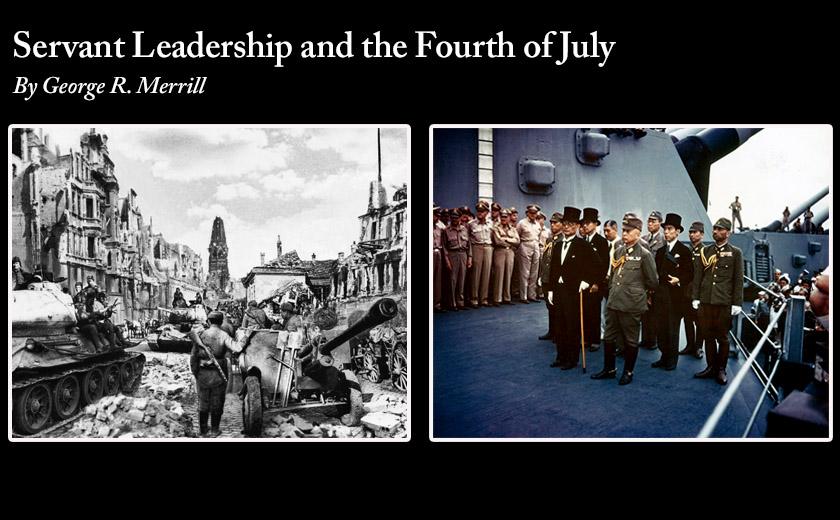I had an uneasy reaction when President Trump recently announced he was planning a more spectacular July 4thcelebration this year in D.C. Bigger than ever, he described it: “a major fireworks display, entertainment and an address by your favorite president, me!”
Might Trump crash the party? It’s a strong possibility.
Whether he does or not, his proposal offended me. I couldn’t see Trump as remotely reflecting American ideals, particular our ideal of servant leadership. The recent funerals of Senator McCain and President Bush were poignant. Both events surfaced collective mourning for our loss of inspired leadership and revealed a national yearning to reclaim its ideals.
When nations face dire adversity, servant leaders act in the interests of the people they serve. When Japan and Germany surrendered in 1945, I recall photographs circulating at the time, two in particular. One was Berlin’s destruction, the other the Japanese delegation signing the surrender on the U.S.S. Missouri.
I was an eleven when the WWII ended.
It was a jubilant time. America rejoiced. So, did I. Bubble gum and Hershey Bars were available again, butter was back on the shelves and rationing ended. Best of all, my father returned from two years at war in Europe.
I remember how The Stars and Stripes, magazines and newspapers were filled with photographs of the desolation that Germany and Japan sustained at the war’s end. The draconian devastation of Berlin, Hiroshima and Nagasaki eventually became visual commentaries on the horrors ofwar. But how each ended the war revealed the consequences of servant leadership and of those of a dictatorship.
At least two years before the war ended many Nazi leaders knew they could not win. Some advisors urged Hitler toconsider surrender. He would have none of it, essentially ensuring an apocalyptic defeat with devastating c0nsequences for civilians. In fact, a discussion of surrender Hitler regarded as treasonous, carrying the death penalty for anyone proposing it. Even as the Soviet and American troops were entering Berlin, Hitler authorized small children to fight and defend the capitaleven as it was being overrun. The Hitler youth were massacred. What became clear to me only years later was that Hitler had no feeling for the German people but onlyhis maniacal vision of a thousand year Reich. I recall my father commenting on the terrible material destructionand civilian suffering he witnessed when his division entered Aachen. I’ve included a picture of Berlin’sdevastation.
Hitler didn’t lead, he dictated. Dictatorships are efficient, often effective but only until things go bad. His stylespawned unnecessary suffering. The people became pawns in his appetite for power and control. Interestingly, Hitler liked huge military parades and making rousing speeches, usually about his greatness. During his rants, he especially liked excoriating Germany’s ‘Untermensch’ – the German equivalent of losers or undesirables. He vowed to rid the country of them. Sound familiar?
When the inevitable end came, Hitler blamed everyoneelse for his defeat. He and many of his key advisors committed suicide, leaving no functional leadership in place effectively abandoning the German people to suffer the brutal consequences of defeat alone.
The Japanese leadership handled defeat differently.
The Japanese held out hope for victory until Hiroshima and Nagasaki. The handwriting, was on the wall. They knew defeat was inevitable.
Their leadership mobilized to accept defeat, and the surrender was conducted with statesmanship, discipline, unusual humility and dignity. The Japanese people were included as a significant piece of the experience at that critical moment in their history. Their emperor publicly expressed compassion for them during the nation’sgreatest humiliation. He spoke directly to the people: “We must now endure the unendurable, and suffer what is insufferable.” It is believed to be the first time the emperor spoke directly to the common people. What I find remarkable is the “we” in that declaration. The emperor, including the political and military leadership did not abandon the people at their darkest hour. Together, they united to “endure the unendurable.”
Our enemies can teach us.
Why I find this particularly poignant is how critical saving face is in Japanese culture. The Japanese delegation hadassembled on the deck of the U.S.S. Missouri (see image.) The vanquished were surrounded by the victors, the ultimate humiliation. Japanese government officials dressed impeccably in morning clothes, white gloves and top hats and the military in full dress uniform. The leadership took full responsibility for their failure. Humbled, they remained in solidarity with their people, whom they represented honorably and with dignity.
July 4th is America’s birthday party. It’s our national blast, yours and mine. We celebrate our ideals and the famous men and women who are and have been our nation’sservant leaders.
I don’t like the idea of someone grabbing center stage at my country’s birthday party, someone uninvited and who, in my opinion hasn’t the vaguest notion of what thecelebration represents to the country.
We don’t hire bouncers at our national celebrations. We’re better than that. It could be that on this fourth, if Trump should speak, that we will have to “endure the unendurable.” As an inclusive people, I know we will be gracious, and maintain our sense of dignity and solidarity as only the American people can.
Should he not speak, he will have served his country well.
Best and Happy Fourth of July.



Mary Anne Leary says
Well said, as always. Thank you, Mr. Merrill.
Trena Williamson says
Nicely said.
Deirdre LaMotte says
Thank you for your thoughtful insight into what a decent and caring leader stands for. Unfortunately, we have a man who is neither
caring or decent in any way. The idea of tanks rolling past this puffed-up loser is creepy.
These are scary times.